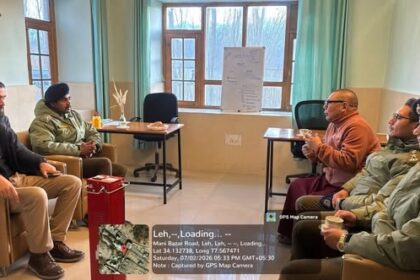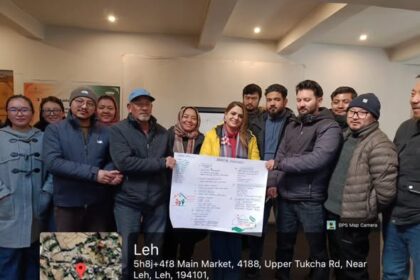||Black and White Digital News ||
||Parvinder Singh July 30,2024 ||
JAMMU/KASHMIR: The J&K Union Territory Government has recently unveiled a controversial plan to outsource properties of the Jammu & Kashmir Tourism Development Corporation (JKTDC), a state-owned Public Sector Undertaking (PSU). These properties, located at prime tourist spots in both Jammu and Kashmir divisions, are reportedly being targeted for outsourcing to select business entities from outside the region.
Built over time with taxpayer money, JKTDC properties were intended to provide affordable accommodation to tourists. The decision to outsource these assets to private players has sparked widespread concern, primarily because it could make these accommodations unaffordable for the common people, who might otherwise rely on these facilities due to the high cost of private hotels in these tourist locations.
Economic and Social Implications:
Critics argue that outsourcing these properties contradicts the principles of public service and economic accessibility. The move is seen as a potential loss to state resources and assets, with significant repercussions.
Affordability:
Privatizing these properties may lead to higher accommodation rates, making it difficult for the average tourist to afford a stay.
Economic Viability:
The government justifies the move by citing the economic non-viability of the JKTDC properties. However, this raises questions about the management and accountability of the PSU officials. There is a strong call for addressing inefficiencies within the organization rather than transferring ownership to private entities.
Unemployment Crisis and Alternatives
J&K currently faces a severe unemployment crisis, with many skilled and educated youth, including professionals, technocrats, and post-graduates, struggling to find jobs. Given this situation, the government’s decision to outsource is being heavily criticized for not leveraging local talent.
Proposed Solution:
Instead of outsourcing, it is suggested that the government should engage Unemployed Youth by employing local youth to manage and operate these properties, the government could address unemployment and maintain the properties’ public service mandate.
Stipend-Based Employment:
Offering stipends to the youth could help in the efficient management of these properties while ensuring they remain affordable for tourists.
Enhanced Economic Viability:
This approach could also potentially enhance the economic viability of JKTDC properties by maintaining affordability and improving service quality.
Governance and Policy Concerns:
There are also legal and administrative concerns regarding the current government’s authority to make such significant policy decisions. Critics argue that the present dispensation in J&K lacks the mandate to execute decisions with far-reaching consequences for state resources.
The plan to outsource JKTDC properties is fraught with economic, social, and governance concerns. It raises fundamental questions about public resource management, affordability of services, and the role of government in addressing unemployment. A re-evaluation of the decision, focusing on internal management reforms and leveraging local talent, might be a more sustainable and equitable approach.
Historical Context:
How JKTDC properties have evolved over time and their significance in the state’s tourism infrastructure.
Government Accountability:
The role of PSU officials in managing JKTDC properties and the need for accountability and management reforms.
Economic Analysis:
Potential revenue impacts of outsourcing vs. keeping the properties under public management, and the implications for state finances.
Social Equity:
The broader social equity issues involved in making public resources accessible to all sections of society, particularly the economically weaker sections.
Comparative Analysis:
Examination of similar outsourcing initiatives in other regions or sectors and their outcomes, providing a comparative perspective.
Policy Alternatives:
Discussion of other policy measures the government could consider to enhance the viability of JKTDC properties without outsourcing.
By covering these aspects in detail, the analysis provides a comprehensive understanding of the issues, concerns, and potential alternatives surrounding the J&K government’s decision to outsource JKTDC properties.
After setting up a panel for outsourcing tourism properties, the Jammu Kashmir Administration has identified 10 assets for which tenders have been floated. An official stated that the Request for Proposal (RFP) of only 10 tourism properties has been rolled out for outsourcing, with bids invited through a tendering process. These properties are equally distributed between Kashmir and Jammu provinces, with more properties likely to be outsourced in the future.
Additionally, as per sources a letter by JKTDC to the Secretary of Royal Springs Golf Course (RSGC) Srinagar indicates a proposal to outsource RSGC through a public-private-partnership (PPP) mode. However, the RFP for RSGC has not yet been issued, with the current focus on the tendering process for the initial 10 properties.
In February, the government reconstituted the committee overseeing the outsourcing process, appointing a new 17-member panel chaired by the Administrative Secretary of the Industries and Commerce Department.
Public and Political Reactions:
The decision has triggered strong reactions from various quarters. Political leaders, civil society groups, and tourism stakeholders have expressed concerns over the potential impact of outsourcing on local employment and the accessibility of affordable tourism services. Some political figures have accused the government of prioritizing business interests over public welfare, arguing that the move could lead to the monopolization of tourism resources by a few large corporations.
Legal and Administrative Challenges:
There are also significant legal and administrative challenges associated with the outsourcing plan. Critics argue that the current government, being a Union Territory administration, may not have the same mandate as a fully elected state government to make such far-reaching decisions. This has led to calls for a thorough review of the decision by higher authorities, including potential judicial scrutiny.
The J&K government’s plan to outsource JKTDC properties presents a complex issue with far-reaching implications for the region’s tourism sector, public resources, and local employment. While the government aims to address economic non-viability, the potential social and economic costs necessitate a careful and inclusive approach. Balancing public service mandates with economic sustainability, leveraging local talent, and ensuring transparent governance will be crucial in navigating the challenges and opportunities presented by this controversial decision.
Leave a comment
You Might Also Like
SSP Leh Along with District Officials Visit De-Addiction Centre Leh, Encourage Patients Towards Recovery and Rehabilitation
SSP Leh Along with District Officials Visit De-Addiction Centre Leh, Encourage Patients Towards Recovery and Rehabilitation Leh, Feb 9: Today,…
1 Min Read
Katra Roop Way Bun Kar Rehega MLA Katra Baldev Raj Sharma Ka Bayan Me Jeeta He Isi Promise Pe Hu
Katra Roop Way Bun Kar Rehega MLA Katra Baldev Raj Sharma Ka Bayan Me Jeeta He Isi Promise Pe Hu…
0 Min Read
PDP Na BJP K Sath Alliance Na Kiya Hota Aaj Article 370 Bhi Hota Aur J&K Ki Halat Bhi Behtar Hoti Nc Senior Leader Mubarak Gul
PDP Na BJP K Sath Alliance Na Kiya Hota Aaj Article 370 Bhi Hota Aur J&K Ki Halat Bhi Behtar…
0 Min Read
Implementation of Rural Development Schemes Concludes at Leh
Implementation of Rural Development Schemes Concludes at Leh Leh, February 07, 2026: The three-day State-Level Training Programme on Effective Implementation…
2 Min Read









